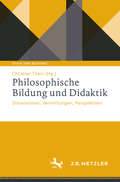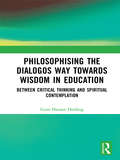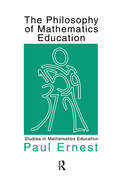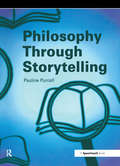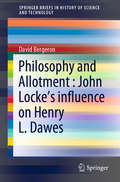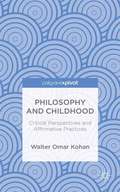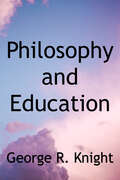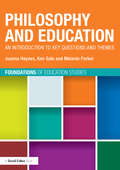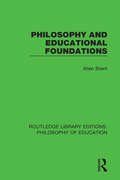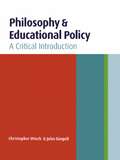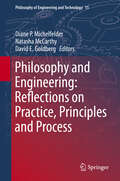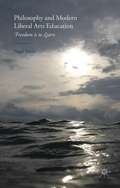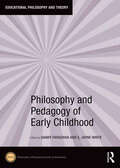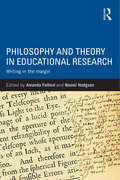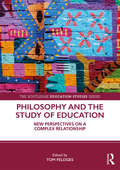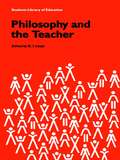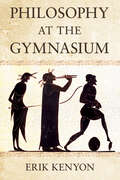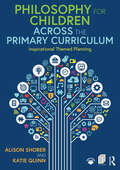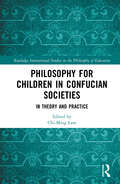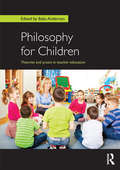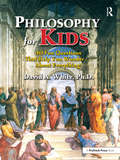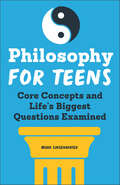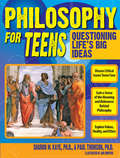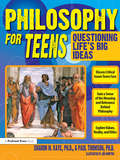- Table View
- List View
Philosophische Bildung und Didaktik: Dimensionen, Vermittlungen, Perspektiven (Ethik und Bildung)
by Christian TheinDie Beiträge dieses Bandes betrachten die Verbindung zwischen bildungsphilosophischen und philosophiedidaktischen Themen. So werden im ersten Teil "Philosophie und Bildung" aus der Philosophie heraus Konzepte und Ideen entwickelt, die für theoretische und praktische Fragen der Bildung von Relevanz sind. Der zweite Teil enthält Beiträge, die das besondere Verhältnis von philosophischer Bildung und Philosophiedidaktik in den Blick nehmen. Der dritte Themenblock schlägt dann die Brücke von den fachdidaktischen Konzepten und Ideen in den konkreten Unterricht: Philosophiedidaktik und philosophische Unterrichtspraxis.
Philosophising the Dialogos Way towards Wisdom in Education: Between Critical Thinking and Spiritual Contemplation
by Guro Hansen HelskogPhilosophising the Dialogos Way towards Wisdom in Education proposes the innovative and holistic Dialogos approach to practical philosophy as a way of facilitating wisdom-oriented pedagogy. The book encourages individual and collective development through dialectical interplays between personal life, philosophical concepts and subject matter. Based on two decades of the author’s reflective pedagogical practice research, this book develops a philosophy of dialogical relationships. It analyses approaches to philosophical practice and suggests facilitation moves and philosophical exercises that can be adapted across educational levels, school subjects and higher education disciplines. Chapters provide examples of transformative philosophical group dialogues and suggest pathways towards multi perspective thinking, mutual understanding and wisdom in culturally diverse contexts. Philosophising the Dialogos Way towards Wisdom in Education can be used as a holistic approach to democracy education, peace education, education for sustainable living and wellbeing. The book will be of great interest to academics, researchers and students in the fields of teacher education, philosophy of education and higher education. It will also appeal to practising professionals such as teachers and teacher educators in secondary and higher education.
Philosophy Mathematics Educ (Studies In Mathematics Education Ser. #No. 1)
by Paul ErnestFirst published in 1991. Routledge is an imprint of Taylor & Francis, an informa company.
Philosophy Through Storytelling
by Pauline PurcellThis is an accessible beginners manual with all you need to run philosophy groups with children or adults. Whether you work with school pupils, students or adults, philosophy offers the opportunity to develop thinking skills that have both personal and academic application. This practical manual contains detailed guidance and a set of short stories for running philosophy groups. It is ideal for use in schools, the sessions can be used in a variety of environments, and with participants of all ages from five to 95. In each session, the participants start with a warm-up, examine a key stimulus, generate questions from that stimulus, agree to focus on one question and share, and challenge and develop views on that question. Finally they consider how well the process went, warm-down and end the session. Using this approach to philosophy is an excellent way to challenge thinking and to encourage interaction, as some participant responses show: 'It's much more worth listening to than I expected', 'It is great to hear what others think and believe', and 'I feel I know the people in my group much better'. This title is particularly ideal for schools using the P4C (Philosophy for Children) method and for adult special needs group leaders. This accessible manual helps you to introduce philosophy to your group and will change how you and your students think about themselves and others.
Philosophy and Allotment : John Locke's influence on Henry L. Dawes (SpringerBriefs in History of Science and Technology)
by David BergeronThis book provides a new perspective for examining the Native policies of the late nineteenth century. It centers on the figure of Henry Laurens Dawes, and more specifically, on the conceptual roots of his views on allotment, education and assimilation. These roots are grounded in John Locke’s epistemology and pedagogy. Through a philosophical analysis of Dawes’ ideas and policies, the book provides a new approach to arrive at a better understanding of an important historical process. In this regard, an often-overlooked link between philosophy and history is clarified, helping philosophers, historians and other scholars in their quest for knowledge. This book clarifies the impact of philosophical ideas on historical conceptions, and by studying Dawes, also addresses the reflection behind a major historical process. Political and social philosophers, as well as historians of ideas and of Native policies, will greatly benefit from this concise book.
Philosophy and Childhood: Critical Perspectives and Affirmative Practices
by Walter Omar KohanKohan offers a transformative, revolutionary, and more radical alternative theory and practice of philosophy for children. He critiques the current state of philosophy for children and demonstrates alternative ways of thinking and practicing philosophy in childhood education.
Philosophy and Education: An Introduction in Christian Perspective
by George R. KnightThis book has been a classic in its field for more than a quarter of a century. New features of this revised and updated fourth edition make it of even greater usefulness in the educational philosophy classrooms of a new century. These include an all-new chapter on the Christian teacher in the public school setting; "Points to Ponder" study questions at the end of each chapter; new material addressing the latest relevant issues, including the rise of the home school movement, and the relation of the Intelligent Design debate to Christian educational philosophy; a fresh, new text design, including call-out highlights of major themes; and an updated bibliography and references.
Philosophy and Education: An introduction to key questions and themes (Foundations of Education Studies)
by Joanna Haynes Ken Gale Melanie ParkerWritten specifically for education studies students, this accessible text offers a clear introduction to philosophy and education. It skilfully guides readers through this challenging and sometimes complex area bringing key philosophical ideas and questions to life in the context and practice of education. There is also a companion website to accompany the book, featuring live weblinks for each activity which can be visited at www.routledge.com/cw/haynes. The authors consider the implications of educational trends and movements through a variety of philosophical lenses such as Marxism, utopianism, feminism and poststructuralism. The book explores enduring themes such as childhood and contemporary issues such as the teaching of critical thinking and philosophy in schools. Features include: a range of individual and group activities that invite questioning and discussion case studies and examples from a variety of formal and informal education settings and contexts reference to philosophically informed practices of research, reading, writing and teaching suggestions for further reading in philosophy and education overviews and - and key questions for each chapter Drawing on readers’ experiences of education, the book reveals the connections between philosophical ideas and educational policy and practice. Part of the Foundations in Education Studies series, this timely textbook is essential reading for students coming to the study of philosophy and education for the first time.
Philosophy and Educational Foundations (Routledge Library Editions: Philosophy of Education)
by Allen BrentWhat models in the social sciences underlie existing or proposed patterns of educational practice? What theories of knowledge inform such models and thus arguably sanction such practice? In this book, first published in 1983, the author seeks some tentative answers. Wittgenstein’s understanding of ‘family resemblance’ and Chomsky’s ‘linguistic universals’ are interpreted, contrary to Hamlyn, as reconcilable notions that can both illuminate and refine Hirst’s understanding of ‘categorical concepts’. In the light of such a reformulated theory, Brent suggest ways in which a unified model of the social sciences could yield a unified curriculum theory. This title will be of interest to students of the philosophy of education and curriculum studies.
Philosophy and Educational Policy: A Critical Introduction
by Christopher Winch John GingellWhat are the concepts and theories behind current debates about education?This comprehensive introduction to philosophy of education discusses issues that are of current public interest and debate. It locates education at the heart of questions concerned with culture, ethics, politics, economics and shows how key educational issues have to be approached in a contextual way. Written in a clear and accessible manner with current issues in mind the book covers: the curriculum teaching and learning educational research assessment moral, personal and civic education autonomy and multicultural issues in a liberal society education and work privatisation and markets This book will be particularly useful to students on Education Studies courses, to those preparing for a career in teaching, to students of politics and to serving teachers undertaking further study in education.
Philosophy and Engineering: Reflections on Practice, Principles and Process
by Natasha Mccarthy David E. Goldberg Diane P MichelfelderBuilding on the breakthrough text Philosophy and Engineering: An Emerging Agenda, this book offers 30 chapters covering conceptual and substantive developments in the philosophy of engineering, along with a series of critical reflections by engineering practitioners. The volume demonstrates how reflective engineering can contribute to a better understanding of engineering identity and explores how integrating engineering and philosophy could lead to innovation in engineering methods, design and education. The volume is divided into reflections on practice, principles and process, each of which challenges prevalent assumptions and commitments within engineering and philosophy. The volume explores the ontological and epistemological dimensions of engineering and exposes the falsity of the commonly held belief that the field is simply the application of science knowledge to problem solving. Above all, the perspectives collected here demonstrate the value of a constructive dialogue between engineering and philosophy and show how collaboration between the disciplines casts light on longstanding problems from both sides. The chapters in this volume are from a diverse and international body of authors, including philosophers and engineers, and represent a highly select group of papers originally presented in three different conferences. These are the 2008 Workshop on Philosophy and Engineering (WPE-2008) held at the Royal Academy of Engineering; the 2009 meeting of the Society for Philosophy and Technology (SPT-2009) at the University of Twente in the Netherlands; and the Forum on Philosophy, Engineering, and Technology (fPET-2010), held in Golden, Colorado at the Colorado School of Mines.
Philosophy and Modern Liberal Arts Education
by Nigel TubbsThis book argues for a modern version of liberal arts education, exploring first principles within the divine comedy of educational logic. By reforming the three philosophies of metaphysics, nature and ethics upon which liberal arts education is based, Tubbs offers a profound transatlantic philosophical and educational challenge to the subject.
Philosophy and Pedagogy of Early Childhood (ISSN)
by Sandy Farquhar and E. Jayne WhiteIn recent years, new discourses have emerged to inform the philosophy and pedagogy of early childhood. This collection brings together contributions from leading scholars in early childhood education, and each chapter engages with the critical task of reformulating early childhood education and the philosophy of the child with a specific focus on pedagogy. The contributors to Philosophy and Pedagogy of Early Childhood explore pedagogy through a philosophical lens, and discuss themes including intersubjectivity, alterity, ethics, and creative experience. Although these themes are addressed in very different ways, each invokes a call to teachers to consider their own position in the dialogical process of learning, and suggests that pedagogy is necessarily situated, provisional, compositional, and discursive. Such critical and philosophical inquiry is a welcome antidote in an era of pedagogical certainty and standards-based agendas. This book was originally published as a special issue of Educational Philosophy and Theory.
Philosophy and Theory in Educational Research: Writing in the margin
by Naomi Hodgson Amanda FulfordPhilosophy and Theory in Educational Research: Writing in the margin explores the practices of reading and writing in educational philosophy and theory. Showing that there is no ‘right way’ to approach research in educational philosophy, but illustrating its possibilities, this text invites an engagement with philosophy as a possibility – and opening possibilities – for educational research. Drawing on their own research and theoretical and philosophical sources, the authors investigate the important issue of what it means to read and write when there is no prescribed structure. Innovative in its contribution to the literature, this edited volume enlightens readers in three ways. The volume focuses on the practices of reading and writing that are central to research in educational philosophy, suggesting that these practices constitute the research, rather than simply reporting it. It is not a prescriptive guide and should not be read procedurally. Rather, it is intended to illustrate the possibilities for this kind of research, and to suggest starting points for those pursuing research projects. Finally, attention is given to the ways in which conducting educational philosophy can be educative in itself, both to the researcher in writing it, and to its audience in reading it. With contributions from international scholars in the field of educational philosophy, this book is a valuable guide for practitioner-researchers, taught postgraduate and doctoral students, and early career researchers in university education departments. Academic staff teaching research methods and seeking to introduce their students to philosophy-as-research without wishing to offer a prescriptive ‘how to’ guide will also find this book of particular interest.
Philosophy and the Study of Education: New Perspectives on a Complex Relationship (The Routledge Education Studies Series)
by Tom FeldgesCombining contributions from international academics and practitioners, this new text develops students’ ability to philosophise as well as learn about philosophy and education. It considers issues concerned with the interface between education and wider society but goes beyond this to explore education and philosophy at a micro level: the teacher–learner relationship. It challenges and empowers students to use philosophy as a tool within education, as a set of theories to understand education and as a potential means to develop solutions to problems as they occur within practice. Assuming no pre-existing philosophical background, Philosophy and the Study of Education explores complex topics including: encouraging young people to criticise and challenge all authority; the limits of a religious-based education; the desire for ‘alternative facts’ or ‘truths’; the second-class status of vocational pursuits; the inherent struggle in the teacher–student relationship; the relationship between emotion, morality and autonomy in teaching. Including discussion questions and further recommended reading, this thought-providing book will support and inspire all those on Education Studies, Childhood Studies and Youth Studies courses in developing a critical perspective and understanding the true value of philosophy within education.
Philosophy and the Teacher (Students Library Of Education Ser.)
by D. I. LloydFirst published in 1976. Routledge is an imprint of Taylor & Francis, an informa company.
Philosophy at the Gymnasium
by Erik KenyonPhilosophy at the Gymnasium returns Greek moral philosophy to its original context—the gyms of Athens—to understand how training for the body sparked training for the mind. The result is an engaging inroad to Greek thought that wrestles with big questions about life, happiness, and education, while providing fresh perspectives on standing scholarly debates.In Philosophy at the Gymnasium, Erik Kenyon reveals the egalitarian spirit of the ancient gym, in which clothes—and with them, social markers—are shed at the door, leaving individuals to compete based on their physical and intellectual merits alone. The work opens with Socratic dialogues set in gyms that call for reform in character education. It explores Plato's moral and political philosophy through the lens of mental and civic health. And it holds up Olympic victors as Aristotle's model for the life of happiness through training.
Philosophy for Children Across the Primary Curriculum: Inspirational Themed Planning
by Katie Quinn Alison ShorerThis is an easy-to-use, theme-based resource book for Philosophy for Children (P4C) practitioners in primary school settings. It covers ten popular themes which include many current affair issues and enduring curriculum themes such as artificial intelligence, biodiversity, resilience, and waste. Each theme provides planning for every subject and links to the relevant English national curriculum expectations. Offering ideas for a year’s worth of work, it can be dipped into for inspiration or used for step-by-step sessions. There are links to video clips, websites, and stories that teachers and practitioners can use to base their concept exploration and enquires on. Presenting a range of philosophical ideas, activities, and resources, this book is essential for all primary P4C facilitators excited by embedding and exploring philosophy across the curriculum.
Philosophy for Children Across the Primary Curriculum: Inspirational Themed Planning
by Katie Quinn Alison ShorerThis is an easy-to-use, theme-based resource book for Philosophy for Children (P4C) practitioners in primary school settings. It covers ten popular themes which include many current affair issues and enduring curriculum themes such as artificial intelligence, biodiversity, resilience, and waste.Each theme provides planning for every subject and links to the relevant English national curriculum expectations. Offering ideas for a year’s worth of work, it can be dipped into for inspiration or used for step-by-step sessions. There are links to video clips, websites, and stories that teachers and practitioners can use to base their concept exploration and enquires on.Presenting a range of philosophical ideas, activities, and resources, this book is essential for all primary P4C facilitators excited by embedding and exploring philosophy across the curriculum.
Philosophy for Children in Confucian Societies: In Theory and Practice (Routledge International Studies in the Philosophy of Education)
by Chi-Ming LamThis book contributes to the theory and practice of Philosophy for Children (P4C), with a special emphasis on theoretical and practical issues confronting researchers and practitioners working in contexts that are strongly influenced by Confucian values and norms. It includes writings by prominent P4C scholars from four Confucian societies, viz., Mainland China, Hong Kong, Taiwan, and Japan. These writings showcase the diversity of the P4C model, providing a platform for researchers and practitioners to tell their stories in their own Confucian cultural contexts. The research stories in the first part of the book are concerned with assessing the impact of traditional Confucian norms, promoting critical thinking, reconstructing the notion of community of inquiry, creating moral winds, integrating philosophy into the school curriculum, and localizing teaching methods and materials. Four issues are discussed in the second part of the book: the tension between Confucianism and powerful thinking; cultural challenges for practitioners; the transformation of harmony; and the conception of family. Taken as a whole, the book provides fresh insights into whether and how P4C’s Westerninfluenced theories and practices are compromised when they are applied in non-Western, or rather Confucian, contexts. A must-read for anyone interested in the theory and practice of P4C and Confucianism in general.
Philosophy for Children: Theories and praxis in teacher education
by Babs AndersonPhilosophy for Children (P4C) is a movement that teaches reasoning and argumentative skills to children of all ages. This book looks at the progress that P4C has made in the UK in addressing issues of literacy, critical thinking, PSHE, education for sustainable development and wider issues such as bullying. Chapters identify the different theories and practices that have emerged and discuss the necessity for a reflective approach that P4C brings to education. The book highlights how this movement can fit into the early years, primary and secondary curriculum and the challenges and rewards that come with it. Chapters include: The Evolution of Philosophy for Children in the UK Pedagogical Judgement Negotiating meaning in classrooms: P4C as an exemplar of dialogic pedagogy The impact of P4C on teacher educators Being and becoming a philosophical teacher This will be an invaluable guide for all those interested in P4C and studying courses on Early Childhood Studies, Education Studies and Initial Teacher Training courses.
Philosophy for Kids: 40 Fun Questions That Help You Wonder About Everything!
by David A. WhiteInspire animated discussions of questions that concern kids—and all of us—with this innovative, interactive book. Open your students' minds to the wonders of philosophy.Allow them to grapple with the questions philosophers have discussed since the ancient Greeks. Questions include: “Who are your friends?,” “Can computers think?,” “Can something logical not make sense?,” and “Can you think about nothing?” Young minds will find these questions to be both entertaining and informative. If you have ever wondered about questions like these, you are well on your way to becoming a philosopher!Philosophy for Kids offers young people the opportunity to become acquainted with the wonders of philosophy. Packed with exciting activities arranged around the topics of values, knowledge, reality, and critical thinking, this book can be used individually or by the whole class. Each activity allows kids to increase their understanding of philosophical concepts and issues and enjoy themselves at the same time. In addition to learning about a challenging subject, students philosophizing in a classroom setting, as well as the casual reader of Philosophy for Kids, will sharpen their ability to think critically about these and similar questions. Experiencing the enjoyment of philosophical thought enhances a young person's appreciation for the importance of reasoning throughout the traditional curriculum of subjects. The book includes activities, teaching tips, a glossary of terms, and suggestions for further reading.Grades 4-12
Philosophy for Teens: Core Concepts and Life's Biggest Questions Examined
by Mark LinsenmayerExplore philosophy through thought-provoking questions for teens If you like to ask deep questions about the world around you, then you already think like a philosopher. This book presents philosophy through fascinating questions you may have already thought about, like: Can we prove the existence of a God? What are minds, really? How can we be sure about anything? Ponder all these ideas and many more as you learn core philosophy concepts and strengthen your critical thinking skills.What sets this book about philosophy for kids ages 12 to 16 apart:An introduction to philosophy—Discover the history of philosophy, what makes a question philosophical in nature, and how being a philosopher can benefit you.The six main branches—Find questions organized by their branch of philosophy: metaphysics, epistemology, ethics, logic, aesthetics, and political philosophy.Philosophy in practice—Learn which philosophers asked and answered each question, explore different sides of an argument, and apply philosophical concepts to real life.Ponder life's biggest questions with this teen-friendly choice in philosophy books.
Philosophy for Teens: Questioning Life's Big Ideas
by Sharon M. Kaye Paul ThomsonWhat is love? Is lying always wrong? Is beauty a matter of fact, or a matter of taste? What is discrimination? The answers to these questions, and more, are examined in Philosophy for Teens: Questioning Life's Big Ideas, an in-depth, teenager-friendly look at the philosophy behind everyday issues. The authors examine some of life's biggest topics, such as lying, cheating, love, beauty, the role of government, hate, and prejudice. Both sides of the debates are covered on every issue, with information from some of the world's most noted philosophers included in a conversational style that teenagers will love. Each chapter includes discussions questions, thought experiments, exercises and activities, and community action steps to help students make reasoned, informed decisions about some of life's greatest debates.
Philosophy for Teens: Questioning Life's Big Ideas (Grades 7-12)
by Sharon M. Kaye Paul ThomsonWhat is love? Is lying always wrong? Is beauty a matter of fact, or a matter of taste? What is discrimination?The answers to these questions, and more, are examined in Philosophy for Teens: Questioning Life's Big Ideas, an in-depth, teenager-friendly look at the philosophy behind everyday issues. The authors examine some of life's biggest topics, such as:lying,cheating,love,beauty,the role of government,hate, andprejudice.Both sides of the debates are covered on every issue, with information from some of the world's most noted philosophers included in a conversational style that teenagers will love. Each chapter includes discussions questions, thought experiments, exercises and activities, and community action steps to help students make reasoned, informed decisions about some of life's greatest debates.Examining life's big ideas and discovering their own opinions have never been easier or more exciting for today's teens.Grades 7-12
